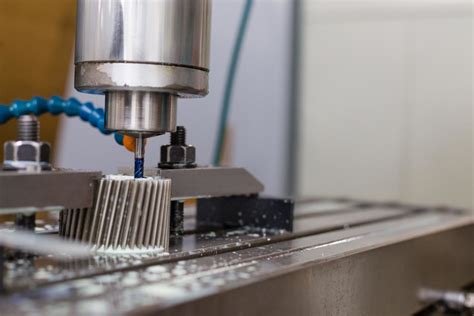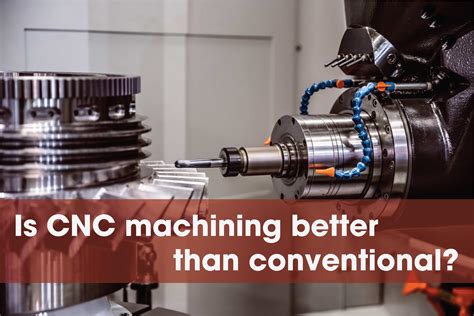difference between conventional and cnc machine Machining can be described as conventional, which requires manual technician prompting and manipulation of the cutting tools, or non-conventional, such as CNC machining, which relies on computer automation . $59.00
0 · what is conventional machining
1 · is cnc machining better than conventional
2 · conventional vs cnc machines
3 · advantages of cnc machinery
The spars are the principle structural members of a wing. They support all distributed loads, as well as concentrated weights such as the fuselage, landing gear, and engines. The skin, which is attached to the wing structure, carries part of the loads imposed during flight. It also transfers the stresses to the wing ribs.
CNC machining has automated the processes that were traditionally done by manually operated equipment. This technology uses computerized controls to shape raw materials into intricate designs with . Key Differences Between CNC and Traditional Machining. Precision and Accuracy. CNC machining is known for its unmatched precision. The use of pre-programmed software . Machining can be described as conventional, which requires manual technician prompting and manipulation of the cutting tools, or non-conventional, such as CNC machining, which relies on computer automation . But CNC machines have a distinct advantage: they make the process of designing, cutting, and building products more sophisticated and easy to carry out. Is There Really a Difference Between the Two? Short answer: .
But CNC machines have a distinct advantage: They make the process of designing, cutting, and building products more sophisticated and easy to carry out, but what’s the real difference between.CNC machining is widely used in industries such as aerospace, automotive, and electronics, where high precision and efficiency are paramount. On the other hand, conventional .
In the case of conventional processing, each machine requires specialized technical personnel, who should have experience, skills and extensive knowledge of the opponent’s machine. In contrast, CNC machining is strictly . What is the Difference Between CNC Machines and Traditional Machines? CNC, or Computer Numerical Control machines, operate through automated digital instructions that control the machining process. This level of .In the ever-evolving landscape of manufacturing, two distinct approaches stand out: Computer Numerical Control (CNC) machining and traditional machining. Both methods have played pivotal roles in shaping the industrial world, each . CNC machining has automated the processes that were traditionally done by manually operated equipment. This technology uses computerized controls to shape raw materials into intricate designs with unparalleled accuracy. On the other hand, conventional machining is rooted in traditional craftsmanship.
CNC machines are computer-controlled devices that automate the production process of a variety of materials, including metals, plastics, and composites. CNC machines are capable of performing intricate and precise operations with greater accuracy and speed than manual fabrication techniques. Key Differences Between CNC and Traditional Machining. Precision and Accuracy. CNC machining is known for its unmatched precision. The use of pre-programmed software allows for extremely accurate cuts, often within tolerances of 0.001 inches or better. Machining can be described as conventional, which requires manual technician prompting and manipulation of the cutting tools, or non-conventional, such as CNC machining, which relies on computer automation to drive the process. While each approach offers distinct drawbacks and advantages, both aim to produce the highest quality machined parts. But CNC machines have a distinct advantage: they make the process of designing, cutting, and building products more sophisticated and easy to carry out. Is There Really a Difference Between the Two? Short answer: yes. Let's dive into the specific differences so you can decide for yourself.
But CNC machines have a distinct advantage: They make the process of designing, cutting, and building products more sophisticated and easy to carry out, but what’s the real difference between.
what is conventional machining

is cnc machining better than conventional
CNC machining is widely used in industries such as aerospace, automotive, and electronics, where high precision and efficiency are paramount. On the other hand, conventional machining finds its applications in industries that deal with custom parts, repairs, or modifications requiring skilled craftsmanship. 8. In the case of conventional processing, each machine requires specialized technical personnel, who should have experience, skills and extensive knowledge of the opponent’s machine. In contrast, CNC machining is strictly controlled by the software program, and almost no manual intervention is required except for the initial setup and data feed.

What is the Difference Between CNC Machines and Traditional Machines? CNC, or Computer Numerical Control machines, operate through automated digital instructions that control the machining process. This level of automation contrasts significantly with traditional machining, where operators manually control the equipment, leading to potential .
In the ever-evolving landscape of manufacturing, two distinct approaches stand out: Computer Numerical Control (CNC) machining and traditional machining. Both methods have played pivotal roles in shaping the industrial world, each with its unique set of advantages and disadvantages. CNC machining has automated the processes that were traditionally done by manually operated equipment. This technology uses computerized controls to shape raw materials into intricate designs with unparalleled accuracy. On the other hand, conventional machining is rooted in traditional craftsmanship. CNC machines are computer-controlled devices that automate the production process of a variety of materials, including metals, plastics, and composites. CNC machines are capable of performing intricate and precise operations with greater accuracy and speed than manual fabrication techniques.
Key Differences Between CNC and Traditional Machining. Precision and Accuracy. CNC machining is known for its unmatched precision. The use of pre-programmed software allows for extremely accurate cuts, often within tolerances of 0.001 inches or better. Machining can be described as conventional, which requires manual technician prompting and manipulation of the cutting tools, or non-conventional, such as CNC machining, which relies on computer automation to drive the process. While each approach offers distinct drawbacks and advantages, both aim to produce the highest quality machined parts. But CNC machines have a distinct advantage: they make the process of designing, cutting, and building products more sophisticated and easy to carry out. Is There Really a Difference Between the Two? Short answer: yes. Let's dive into the specific differences so you can decide for yourself.
But CNC machines have a distinct advantage: They make the process of designing, cutting, and building products more sophisticated and easy to carry out, but what’s the real difference between.CNC machining is widely used in industries such as aerospace, automotive, and electronics, where high precision and efficiency are paramount. On the other hand, conventional machining finds its applications in industries that deal with custom parts, repairs, or modifications requiring skilled craftsmanship. 8. In the case of conventional processing, each machine requires specialized technical personnel, who should have experience, skills and extensive knowledge of the opponent’s machine. In contrast, CNC machining is strictly controlled by the software program, and almost no manual intervention is required except for the initial setup and data feed.
What is the Difference Between CNC Machines and Traditional Machines? CNC, or Computer Numerical Control machines, operate through automated digital instructions that control the machining process. This level of automation contrasts significantly with traditional machining, where operators manually control the equipment, leading to potential .

conventional vs cnc machines

electric cabinet box production line
$10.99
difference between conventional and cnc machine|advantages of cnc machinery